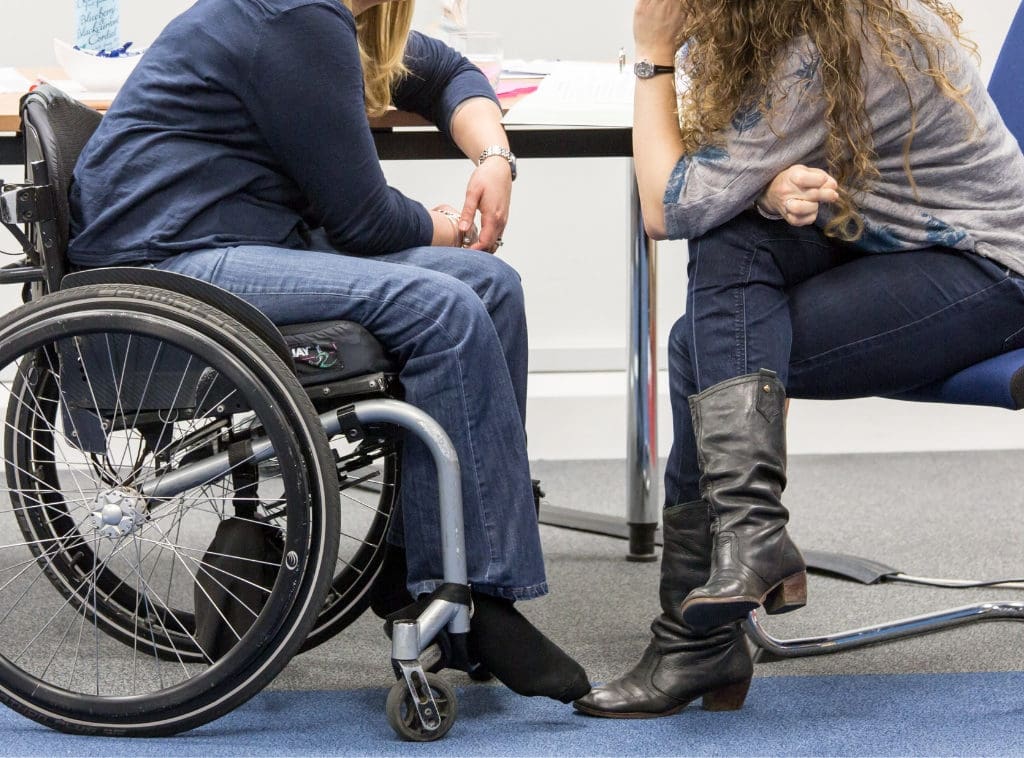Female experiences with sexuality after spinal cord injury
6 February 2019

We recently spoke to Advanced Practitioner Occupational Therapist, Helen Thrussell, about her research into female experiences of sexuality after spinal cord injury with Honorary Research Fellow, Maureen Coggrave. She shared some of their findings with us.
What came out of the research that surprised you?
I didn’t realise quite how soon some women started to think about sex after their injury. Some women wanted to be sexually active, while others were worried that sex might not even be possible. Lots of the participants also told me that they were worried about whether they could still have a family or a relationship. These concerns were really high up the agenda.
As care professionals, we weren’t aware that this was happening. We always think about the practicalities like whether people can handle their bladder and bowel care or if their home is safe to return to post injury. Spinal centre staff need to be open about sexual issues and let newly injured people know that they can talk to us about whatever they want.
How did the participants deal with the bladder and bowel issues that can affect sexual experiences?
There’s a lot of planning involved, which can make sex feel less spontaneous unfortunately.
“Our whole life revolves around bladder and bowel. So, yes, sexual activity is no different.” (Research participant, 45, T11).
While the preparation was seen as a mood killer, it did help the participants to feel more comfortable. By checking their bladder and bowel ahead of any sexual activity, they knew that an accident was less likely. This made it easier for them to relax and enjoy themselves. One participant said that she and her husband just go with things in the moment. If she has an accident, then they would just deal with it if it happened. She’d also come to a point where her bowels were not so much an issue, as she had a regular routine. It really depends on what works for you and your partner.
The participants had differing opinions on how open to be about the effects of their injury. One woman told me that she’d never told her husband that she manually evacuated, but others were very open about their continence management. They had more of a ‘this is who I am – take it or leave it’ kind of attitude.
What particular issues do women with a higher-level injury face?
The women who had a personal assistant (PA) in their home found it hard to maintain their privacy. They worried about the carers overhearing them when they were with their partners. Two participants were paranoid that their PAs would know they’d been sexually active when they were assisting them with their daily routine the next morning.
From the discussions I had, it seemed to be really important to have a good relationship with your PA. This helped participants to feel more in control of their private lives.
There could also be confusion when the lines between partner and carer get blurred. Women with a higher level injury generally expressed frustration that they needed their partners to manage some aspects of their sexual activity. While the lack of independence was understandably upsetting, the best approach seemed to be having an honest conversation with your partner and working out a solution together.
What extra support should be available to help woman deal with the sexual issues a spinal cord injury poses?
I think peer support can be immensely helpful, and all the participants who’d had the chance to speak to someone of a similar age and injury level found it invaluable. Female in-patients often meet up outside of therapy sessions to talk about sex, relationships and other issues. We’re also trying to organise women-only groups in the centre on the physical and psychological aspects of sexuality.
Every participant who’d had access to a psychosexual therapist said it was really beneficial. For some of them, it was the first time they’d talked about sex with their partner post injury. It was also a great opportunity for their partners to share their concerns too.
Generally, sexuality really needs to be further up the agenda and an important part of every patient’s rehabilitation. All newly injured people should have detailed, open and tailored sex education.
What advice would you give to someone who was newly injured and starting to explore their sexuality?
I would advise them to explore themselves, if they were able to, so they can see what sensation they have. It’s good to do this first before resuming any sort of sexual activity because it gives you time to adjust. One woman talked about how it felt like her world had ended when she first realised she had limited feeling. You need to prepare yourself because it may be different.
I’d also advise getting a good bladder and bowel routine in place. This will make you feel less worried about having an accident. If you’re on the ward of a spinal centre, make sure that you ask the staff about continence management.
Be open to trying new things like using vibration and different aids that can help your enjoyment. Set up the bedroom to suit your needs and use pillows to support your pelvis if necessary. Being open with your partner can help too. It’s not easy, but it does make a difference to tell them what you need to feel comfortable and enjoy yourself.
A full copy of the research article can be found in the November 2018 issue of Spinal Cord journal. If you’d like to find out more about the research project, please contact Helen Thrussell at helen.thrussell@nhs.net
If you would like to find your nearest psychosexual therapist, please visit the COSRT website. If you would like to take the first step in talking about sex and intimacy after a spinal cord injury, please email our outreach and support team or call them on 020 8875 1805.


